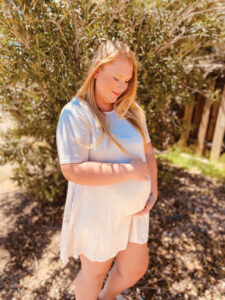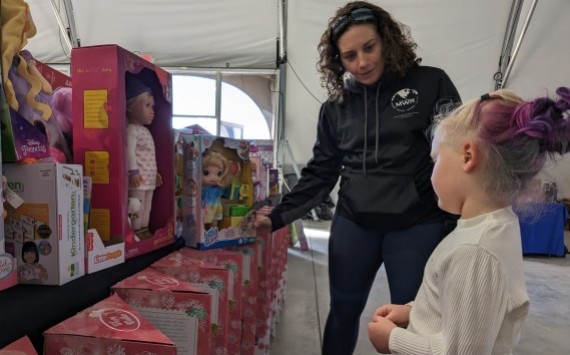FORT IRWIN, Calif. — When Rubi Diaz found out she and her husband, Javier Luis Aguirre, were expecting their first child in Fort Irwin amid a pandemic, they were anxious.
“I was so happy and excited when I first found out I was pregnant,” Diaz said. At 24-years-old, and seven months pregnant, Diaz didn’t expect this experience to be so scary.
“I’m terrified and, as weird as it sounds, already feel like I’m failing as a mother before even giving birth because I feel like I can’t protect or am uncapable of properly providing for my child,” she said.
During March and August, Weed Army Community Hospital began implementing new patient and visitor policies due to the COVID-19 coronavirus, to ensure the health and safety of everyone. It includes prohibiting visitors under 18 and only allowing one visitor in labor and delivery with limited entry and exit of the patient’s room. It also includes more telephonic appointments, with in-person meetings occurring when it’s medically necessary.
Stephanie Faine is also seven months pregnant and has concerns about those labor and delivery restrictions as she said she and her husband, Sgt. Deshun Faine are expecting their third child to complete her family.
“My biggest fear is having to deliver my baby by myself because my husband will have to stay with the kids because our family isn’t going to be able to come and once he enters the hospital, he can’t leave,” Faine said. “I also have a fear of getting it while at the hospital, as well.”
Hospital leaders say the measures put in place at the facility have significantly reduced COVID-19 exposure and the health professionals continue to keep everyone’s safety health a priority.
“I appreciate all the extra precautions the hospital is taking to keep us safe,” Faine said.
Tylisha Lee, 22, also said the hospital is doing a very nice job of keeping everything clean.
“They recently canceled my appointment and I had to do a phone appointment,” she said. “It didn’t bother me because of everything that’s going on.”
The Centers for Disease Control and Prevention (CDC), says they do not currently know if pregnant women have a greater chance of getting sick from COVID-19 than the general public. The CDC also doesn’t know whether pregnant women are more likely to have a serious illness as a result but based on available information, they say pregnant people seem to have the same risk as adults who are not pregnant.
Diaz, Lee and Faine all agree they miss getting to go off post to satisfy their food cravings (Fort Irwin and the State of California are under a Stay Home Order), as well as the physical contact with their extended family, but they enjoy being able to spend more time with their husbands, which may not have been possible if the rotational training was still in force.
“We have really been enjoying time with having our soldier home and getting stuff ready for the baby to come in July,” Faine said.
Lee is happy she isn’t having any complications.
“I’m having a very healthy pregnancy,” she said. “And I have so much support during this time.”
Diaz is trying to be positive and make the best out of the situation.
“My best experience would have to be that I can spend more time with my husband,” she said. “He spends more time at home and we spend a lot more time together as a couple. Before I would miss him throughout the day until he got home from work, and when he was home, he was too tired to really spend time with me. Now we get to experience our pregnancy together.”

Pregnant women are advised to follow the same preventative procedures as everyone else when it comes to washing hands frequently, wearing masks, avoiding face touching, physical distancing and frequently disinfecting surfaces. It’s also advised that pregnant women talk to their doctor, even if they have very mild symptoms and doctors say fevers should be controlled as quickly as possible because they may cause stress to the fetus.
According to the CDC, pregnant people have had a higher risk of severe illness when infected with viruses from the same family as COVID-19 and other viral respiratory infections, such as influenza but here are seven tips they offer during these times.
Pregnancy During COVID-19 (cdc.gov):
• Pregnant people have changes in their bodies that may increase their risk of some infections.
• Pregnant people have had a higher risk of severe illness when infected with viruses from the same family as COVID-19 and other viral respiratory infections, such as influenza.
• Mother-to-child transmission of coronavirus during pregnancy is unlikely, but after birth a newborn is susceptible to person-to-person spread.
• A very small number of babies have tested positive for the virus shortly after birth. However, it is unknown if these babies got the virus before or after birth.
• The virus has not been detected in amniotic fluid, breastmilk, or other maternal samples.
• In limited studies, COVID-19 has not been detected in breast milk; however, we do not know for sure whether mothers with COVID-19 can spread the virus via breast milk.
• If you are sick and choose to direct breastfeed, wear a facemask and wash your hands before each feeding.












